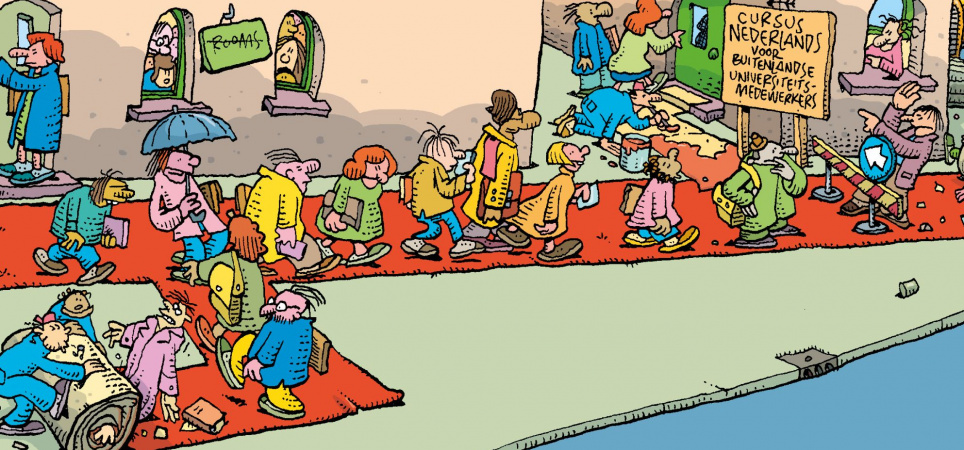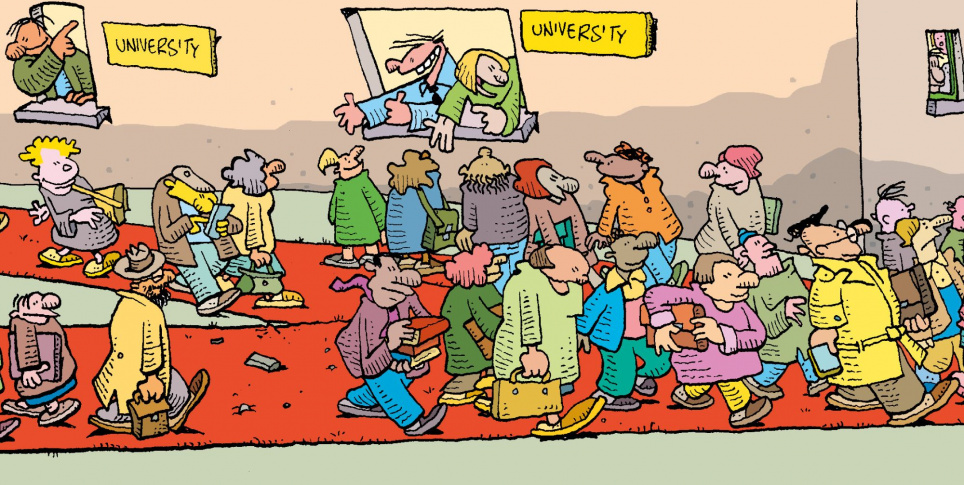Red carpet for internationals disappears
Friend and foe agree that internationalization at universities has gotten out of hand. Education must reduce Anglicization. How do you do that if half of the teachers cannot teach in Dutch?

After years of uncontrolled growth, drastic measures to stem the flow of international students are no longer avoidable. Image Wim Stevenhagen.
Things are changing. After years of uncontrolled growth, drastic measures to stem the flow of international students are no longer avoidable. Especially not at universities, where one in four students comes from abroad and 30 percent of bachelor's programs are only offered in English.
Minister Dijkgraaf, who has been out of office for six months, is continuing to work on the Balanced Internationalization Act, which should put a brake on the foreign influx and strengthen the position of Dutch. A large majority in the House of Representatives demands that the institutions make a plan in advance of that law to significantly reduce the share of English-taught courses. The universities resisted for a long time, but are now preparing for the inevitable, according to a small selection of reports in the university magazines.
Sportfacilititen
The sports center of the University of Amsterdam (UvA) is already anticipating a decline in international influx. At the UvA, one in three students comes from abroad and those 15 internationals make extensive use of the sports facilities. That is why the sports center is already looking for a new customer base. Employees of the Amsterdam University of the Arts can already go there cheaply, and the 3300 art students will soon follow. In addition, there are discussions with Inholland University of Applied Sciences, the Vrije Universiteit and the vocational institutions in Amsterdam.
There is fear that jobs will be at risk
The Language Center of the University of Groningen has developed a Dutch course especially for the international staff of the Faculty of Economics and Business. Because more teachers are needed in the short term who can teach in Dutch. The faculty board takes into account that English-language bachelor's programs such as economics and business economics must switch to bilingual education. International business and econometrics & operations research may remain in English, but then the number of study places will be capped and active recruitment of international students will be stopped.

The most striking message comes from Maastricht. The most international university in the Netherlands wants to recruit more Dutch students. The fact that 72 percent of the intake for bachelor's programs comes from abroad is a bit shocking, even by Maastricht standards. By using Dutch as the working language during open days and making the English-language website bilingual, the university hopes to lower the barrier for pre-university students.
Red carpet
The messages tumbling over each other are causing unrest among scientific staff. “There is still a lot of uncertainty about the measures. Rumors are circulating. There is fear that jobs will be at risk if education programs are cut," says Kathryn Roberts, AObrepresentative at the University of Groningen. “There is a fear that all bachelor education will have to be taught in Dutch,” says Anouk Beniest, assistant professor of earth sciences at the Vrije Universiteit. She is co-founder of APNet, a national network organization for assistant professors, as university professors are called in English. A recent poll among the 130 APNet members shows that some internationals fear having to leave the Netherlands, says vice-chairman Athina Vidaki, research leader at the Maastricht University Medical Center. “They are afraid that their contract will not be extended because they do not speak Dutch, which would of course be a form of discrimination.”
The cover is a shock to international teachers
The cover is a shock to international teachers. For years the red carpet has been laid out for them. Scientific employees recruited abroad receive a significant tax benefit. They do not have to pay tax on 30 percent of their wages for five years. This gives a university lecturer a benefit of 600 to 800 euros per month. But this arrangement is already being gnawed at (see box 'Tax benefits for expats phased out').
Universities are happy to use this favorable tax agreement when recruiting international staff. Successfully. In 2003, 20 percent of scientific staff came from abroad, in 2022 this was 46,4 percent. That is almost 17 thousand people, of which an estimated 10 thousand use the 30 percent scheme.
Among university teachers, who provide the lion's share of education, the share of internationals is as high as 48,6 percent. That explains the panicky atmosphere about reducing Anglicization. “Switching to Dutch will be very difficult for us,” says Kathryn Roberts, who came to Groningen from the US six years ago and teaches at the American studies course. The bachelor's program mainly attracts Dutch students, but is taught in English. “We use English-language sources in education. Moreover, 75 percent of the staff is international and not everyone speaks Dutch. “I have now taken six courses, in my own time, and can get by in Dutch within the organization. But in order to provide university education in Dutch, I need further training.”
Academic Dutch
Bringing the language to an academic level takes a lot of time and energy, says Pierre Chopin, assistant professor at the VU Institute for Environmental Studies. The Frenchman has taken three language courses in the 2,5 years he has lived in Amsterdam and has now reached the level of the integration exam that refugees must pass. “In 2022, I took my second and third Dutch courses from September to December. During that period I had lessons twice a week for 3,5 hours. That was very intensive. By the end of the year I was completely exhausted.”
We are not robots that you can reprogram at the push of a button
Bringing his Dutch to an academic level would cost him another 700 hours. “I would like to learn Dutch better, but 700 hours, that's almost five months. Where do you find the time for that? Working at the university is already quite stressful. It is competitive, the workload is very high. At the end of the day you really don't have the energy to learn the language.”
Another concern is the extra work involved in converting English courses into Dutch, the APNet poll shows. “Who's going to do that? This also causes headaches for our Dutch colleagues,” says Athina Vidaki. “They also fear that their teaching tasks will be limited to teaching in the bachelor's degree because international teachers can only teach in the English-language master's programs for the time being.”

It is understandable that the Dutch government wants to control the international influx, but “it is crazy to do that through language,” says Anouk Beniest. “In doing so, we are creating barriers for international talent that we desperately need to tackle the problems we face in the world: the energy transition, climate change. If there are too many foreign students for certain courses, you have to do something about it. But we have too few students in earth sciences and there will only be fewer if we Dutchify all education.”
Ten years
The language is not the culprit, but the way in which the universities are funded, says Tim de Winkel, media and communication teacher at Erasmus University and sector director at the AOb. “The incentives are aimed at attracting more and more international students. This has led to practices that no longer have anything to do with internationalization. Just like the minister, we are in favor of reducing undesirable internationalization, but you do not do this by completely turning university education upside down.”
In any case, Dutchification cannot be done overnight, says Kathryn Roberts. “We are not robots that you can reprogram at the push of a button. The lopsided growth has arisen in ten years, we need at least that much time to restore the balance.”